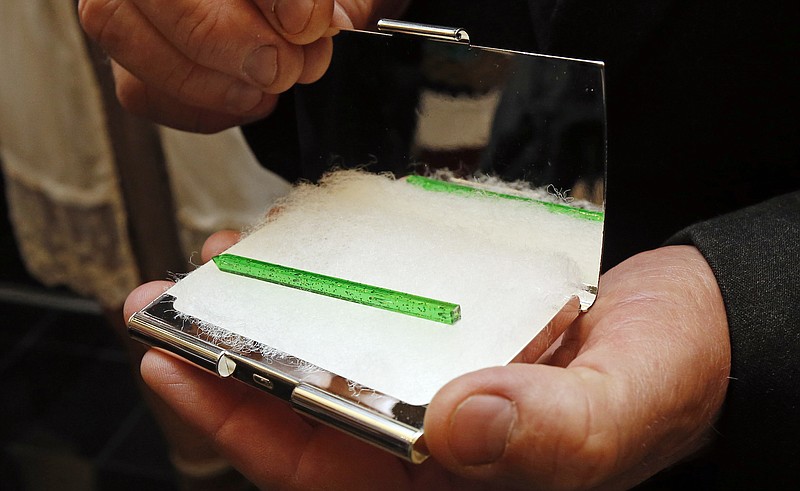JACKSON, Miss. (AP) - Republicans drew the short straw Friday in Mississippi. Seriously.
To break a tie from a Nov. 3 state House election, 20-year Democratic incumbent Bo Eaton and Republican challenger Mark Tullos met in the governor's crowded conference room on the 19th floor of a state office building to carry out the archaic procedure prescribed in state law - they drew straws.
Eaton, listed first on the ballot, reached into a red canvas bag and pulled out one of two silver-plated business card boxes engraved with the word "Mississippi." Tullos pulled out the other padded box, and the two men opened them.
Eaton's box held the winner - a 3-inch green plastic straw. Tullos' had a 2-inch red straw.
With his victory, Eaton blocks the GOP from having a supermajority in the House, a three-fifths margin that would have allowed Republicans, in theory, to make multimillion-dollar decisions about taxes without seeking help from Democrats.
"There's always happiness in a good crop year," Eaton, a farmer from Taylorsville, said after winning.
Tullos showed no emotion. He shook hands with Eaton and left the room without speaking to reporters.
The fight isn't over. Tullos, an attorney from Raleigh, said before the drawing that if he lost, he intended to ask the House to seat him in January as the winner because he questions whether votes were counted fairly. He had already filed an appeal by Friday.
Eaton had said he would accept the result of the drawing, no matter what happened. He chuckled when he was asked if he had a strategy for choosing a box from the bag.
"I'm a Southern Baptist, but I have a little bit of Presbyterian - about a quarter's worth of Presbyterian," Eaton said in his slow drawl. "So whatever will be, will be."
Certified returns show each candidate received 4,589 votes in the district in south central Mississippi, a part of the state known for oil wells and watermelon fields.
A Tullos victory would have given Republicans 74 seats in the 122-member House. They already have a supermajority in the 52-member state Senate, and Gov. Phil Bryant is Republican. Democrats in the current term have blocked Republicans' efforts to pass hundreds of millions of dollars' worth of tax cuts, arguing instead that Mississippi needs to put more money into chronically underfunded schools. Without a supermajority, Republicans will at least need to court a few Democrats to make changes to tax laws.
The National Conference of State Legislatures says 24 states have laws that say a tied legislative election is decided by drawing straws or by flipping a coin.
In Alaska in 2006, a coin flip broke the tie in a Democratic primary for a state House seat. An Alaska Mint medallion was used, with a walrus on the "heads" side and the State of Alaska seal - the fancy crest on paper, not the kind of seal that swims - on the "tails" side. Incumbent Rep. Carl Moses called "heads." He lost the flip, and the primary, to challenger Bryce Edgmon, who is still in the House today.
In New Mexico, the current Senate minority whip, Republican William Payne of Albuquerque, won his first primary with a coin toss in 1996.
Connecticut rewrote its law in 2007 to eliminate the use of chance, such as a coin toss, to break a tie in a legislative primary. The change came a year after a coin toss decided the winner of a Democratic primary for a state House seat.
A game of chance can be used to decide other types of elections, as well. In a portion of Daviess County, Kentucky, in 2012, a coin toss broke a 21-21 tie in a local liquor election. The alcohol opponents won, and Graham Precinct remained dry.
____
Associated Press writers Becky Bohrer in Juneau, Alaska; Susan Montoya Bryan in Albuquerque, New Mexico; Susan Haigh in Hartford, Connecticut; and Beth Campbell in Louisville, Kentucky, contributed to this report.
____
Follow Emily Wagster Pettus on Twitter: http://twitter.com/EWagsterPettus .
